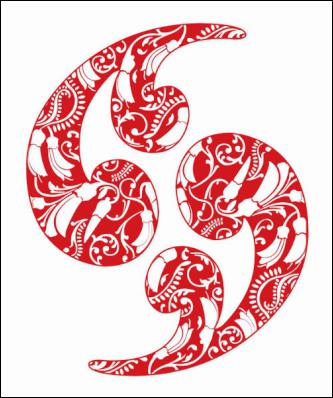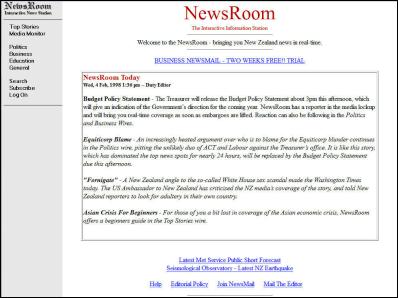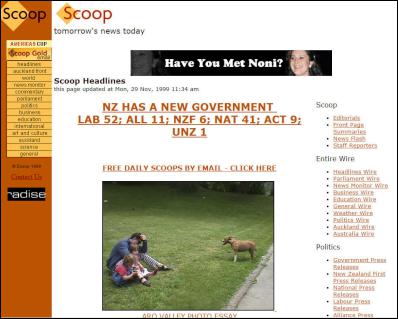Setting Free The News - The Story Of Scoop #1
By Scoop Editor and Publisher Alastair Thompson
NOTE: This column is a component of Scoop's "Operation Chrysalis" (click to find out more)
This past Friday, December 19th, Scoop launched a transformation process the purpose of which is to pass on the 15.5 year old Scoop Project to a new team. "Operation Chrysalis" will unfold over the coming six months.
What we have announced begs a lot of questions, some of which are already being asked in response to our announcement.
What precisely are Scoop's owners and founders trying to pass on? Why? What is Scoop all about? Why does it's continued contribution to media in NZ matter?
This
is the first of a series of columns will address these and
other questions under the heading "The Story of
Scoop".
CONTENTS:
1. The Mission Of Scoop
2. The Beginnings Of Scoop - In NZ's Parliament
3. Setting Free The News
4. The Beginning Of Open Access To Publication
5. Open & Inclusive - A Home For NZ's National Debate
6. A Source Of Actionable Intelligence & An Institutional Memory
7. Scoop's Catch 22 Dilemma - How/Who Should Pay For It?

The Scoop Project is unique in NZ media. It has a unique history which begins near the dawn of the internet age. Scoop is the repository of a unique and very useful set of content, and it has a uniquely influential audience of media, power brokers and business leaders.
But most importantly in relation to "Operation Chrysalis" Scoop's existence creates a unique opportunity for the evolution of a positive future for news in New Zealand, a future which at present is otherwise looking decidedly dark.
In later columns I will tell the story of where Scoop came from, how it struggled, how it grew, and the lessons we have learned along the way. Lying behind that story is the why. Why did we bother? Why did we care?
My view is that it is the purpose and intention of Scoop that explains why so many people and organisations have contributed to keep it going over its 15.5 year lifetime. This column addresses the purpose and rationale behind the Scoop that you see today.
Scoop's purpose is summarised in its Mission Statement the full text of which reads:
Scoop's Mission
freedom, expression, ideas, information, empowerment, transformation
The scoop.co.nz publication is a new media, born of the internet and populated by material of the internet. It delivers news in a totally new way – unprocessed and raw “from the horse's mouth”. Scoop.co.nz is transforming the news environment – providing an open forum for a variety of perspectives to co-exist just as the sources intended.In the paper you read digested news - usually late. On the radio and TV you receive sound-bite news - compressed to fit demographic formats that must select and discriminate. Censor.
The majority of internet based news services are based on feeds of news from the old – real-world – media, transcribed and regurgitated online. Scoop.co.nz is not – it's raw news as it gets released.
On Scoop you can read the news at the same time that the media are reading it. It is all here.. the good oil.. the whole story..the whole speech..what the Prime Minister really said, not what the reporter heard them say. Better yet you get to hear it when the Prime Minister said it. Not tomorrow.
Scoop believes in the power of information to transform lives. It believes in the power of the internet to resolve conflict. And it believes in the power of compelling ideas to propel themselves into political consciousness if they are able to get exposure and be debated. Scoop is, necessarily, a forum that is neither censored through its own prejudices nor controlled by a multinational media conglomerate.
Therefore Scoop's mission is: “To be an agent of positive change.”
While it wasn't till 2005 that we expressed our mission in these words on the website - the ideas behind it were discovered much earlier - and they were discovered through experience.
Now, with the benefit of hindsight, I think it was the delight of actually being an agent of positive change which drove us to work long hours during the lengthy start-up period, and to carry on with the project in the decade since.
The Beginnings Of Scoop - In NZ's
Parliament
The story of Scoop begins two
and half years before Scoop, at the end of 1996, in a dingy
flat on The Terrace in central Wellington. I was visiting my
friend Peter Fowler who had recently resigned from Radio New
Zealand. He was feeling a little low and wanted to set up a
news website, having dabbled in internet innovation earlier
in the year with the world's first Volcano Cam.
At the time I had been in the Press Gallery for three years it was out of this that the idea of Scoop arose. In those days press releases & speeches from political parties were printed out and dropped manually into trays at in the offices of media organisations in the Press Gallery. And then mostly ignored. I suggested a very simple idea to Peter. Why not base a website around publishing those press releases and speeches? This was a rich source of free content and making it available would provide an insight into the heart of how Government worked, and people would likely find this useful. And they did.
Like most internet start-up founders we thought the idea genius and that it would make us rich and famous. It didn't.
We launched a website called NewsRoom at the end of 1996 bringing it live shortly after the conclusion of the lengthy post-election coalition negotiations which led to the formation of the first MMP Coalition Government.

Click for big version
The original NewsRoom, circa. 1997 - Via the Internet Archive
In the months that followed the Parliamentary political parties, especially the incoming opposition - The Alliance and the Labour Party - very quickly embraced our innovation.
For the first time the news angles which were being produced by their research team were guaranteed of getting a run. In these days the parties didn't even have their own websites.
They liked what we were doing so much that they started to publish directly onto our site.
And pretty quickly what we had done changed the speed with which political news stories would develop. Stories which would normally only have a life if a reporter took them up and pursued them developed a life exclusively as a series of releases. And even when a story never saw the light of day in external media it could still be influential in the public policy setting process.
Initially none of this was earning us any money but after a few months we developed Newsmail, a product which let people subscribe to receive the press releases, as they were published, in real-time. Public and Govt. relations firms and industry lobby groups loved it and we provided the service to our Parliamentary publishers in return for their contributing content.
In May1999, three years after NewsRoom launched three of the four founders of NewsRoom split from the company over financial, management and editorial differences on the future direction of the project. A report on the messy business breakdown published in City Voice at the time makes for awkward reading 18 years later.
In the report Fowler who remained at NewsRoom is reported saying, "screen-based users want quick facts, not opinions". I am quoted as saying, "Newsroom was a cooperative venture set up by four guys who had a dream about something that was going to make a difference from a political point of view - by publishing a very wide range of opinions independent of the mainstream media." With hindsight I can see now that we were both right, back then, as now, the real obstacle to digital media innovation in NZ was scarcity of resources.
Scoop.co.nz was launched on June 9th 1999 and took over the "public" mission of the original NewsRoom. For its part NewsRoom continued and shortly thereafter introduced a paywall and focussed on servicing its paying customers.

Scoop announcing the election of the fifth Labour Government in November 1999 - via the Internet Archive
The Beginning Of Open Access To Publication
In the context of the huge range of freedom of expression we now enjoy on the internet it is difficult to imagine how different things were back in the early days of the internet.
Traditional news media organisations have always been first and foremost gate-keeping institutions.
While the trivial and boring is obviously not newsworthy, so are opinions which are unconventional, and ideas which don't fit the narrative or format of the publication. Ideas which originate from a minority point of view, or which might upset a substantial part of the audience are often also excluded from public discourse.
In addition there are always space constraints. The media are always unable to publish all the news. In any given news cycle most news misses out.
Scoop's new news model broke this mold. Scoop deliberately chose not to discriminate. Our publishing policy which also dates to 2005 states:
The Scoop.co.nz Publishing Policy
Scoop's policy on the publication of press release and associated material is simple. If it's a press release issued in New Zealand, is legible, legal, sane, not hateful and not defamatory we will most probably publish it.While we must reserve the right to refuse any material for publication, and also to remove material at any time without notification, we don't tend to exercise it very often.
We also reserve the right link the news we choose to feature in our feature panels, to edit and correct material if necessary, to distribute material published via email and databases and to publish the views of those who might disagree with you.
Scoop is always keen to receive submissions from columnists, journalists and writers from all around the world. For the avoidance of disappointment we do not tend to pay submitters for their material.
Comments, articles, speeches and press releases should be directed to:editor@scoop.co.nz
This policy means that Scoop has till now published nearly everybody's views provided they are expressed as a press release. We draw the line at hate speech and harmful communications - intimidation, defamation etc. - and things which are clearly insane. But the exclusion bar is deliberately set fairly high.
In many ways this has created something of a rod for our own backs, but our view is that by giving nearly everybody a voice we both encourage public participation in things that matter, and also provide a release valve for the feelings of frustration which arise when people feel that they are "locked out" of public debate.
As Scoop evolves in the years ahead just where we should draw these lines will continue to be debated.A good argument can certainly now be made that as there are ubiquitous open publishing platforms like Facebook around we could now choose to be much more discriminating.
That said I would like to think that by providing a platform for participating in public policy matters from the earliest days of the internet we have fostered a culture of participation in civil society which will endure.
Open And Inclusive - A Home For NZ's National Debate
Importantly Scoop is not just open, it is also inclusive. And perhaps because we have almost always been here and are so visible, everybody contributes to us.
Scoop publishes all opinions - from all corners of the political spectrum. We have always posted PRs from both Greenpeace and Sea Shepherd as well as those from the scientific whaling apologists at the Institute for Cetacean Research. We publish the views of climate change deniers as well as those of Generation Zero, the Act Party and Mana Movement, Muriel Newman and the Child Poverty Action Group, ALRANZ and Right To Life.
Scoop's internal dialogue is inherently dialectical. And it is that way by design. And that too is different from nearly all other media.
This is most obvious on the day of the Budget. Each budget day Scoop hosts an ever larger festival of communication from institutions and stakeholders having their say on the decisions being made by Government about the year ahead. Having watched this engagement grow over 15 budgets.
Plurality of political views is a sign of political health and Scoop not only encourages it, but celebrates it. By including all voices we help normalise the idea that we can disagree with each other without resorting to conflict. We enable everybody to know what is being said about them - and also provide everybody with an opportunity to respond. This is civilised, even-handed and principled.
A Source Of Actionable Intelligence & An Institutional Memory
Thanks to Scoop, Kiwis, their Government, NZ businesses and NZ Civil Society is continually and effortlessly informed about the things they need to know - important things, like what is happening to their regulatory environment; what their competitors are doing; and who else is upset about, or supports this or that Government decision.
And this is during a period of continual and seemingly unstoppable decline in the capacity of NZ's other media to deliver them that information.
In addition, because Scoop's entire 15-year-long database of content is accessible via Google, kiwis who want to know what is going on are able to see what is going on right now, and also how we got here, on their mobile phone.
Where we used to be guarded from public malfeasance in part by journalists' institutional memories, now thanks to Scoop we can at least look things up if we want to. And because media can look things up too, they also probably make far fewer mistakes than would if we were not providing such an easily accessible fact checking repository.
In recent years Scoop's role as a reliable source has been institutionalized. Scoop links are referenced in hundreds of newsletters and media often reference that they know something thanks to Scoop without referring even to the fact that Scoop is a website.
Scoop's Catch 22 Dilemma - How/Who Should Pay For The Cow?
Unfortunately Scoop's role in providing an informational pathways enabling public discourse, as well as an institutional memory which protects us from ignorance and deceit is unacknowledged and unsupported by many of the institutions and organisations that benefit the most from our existence.
This is what needs to change if Scoop is to become sustainable and to thrive. And this is what "Operation Chrysalis" has been launched to address.
The reasons Scoop's utility has not been greeted with greater commercial success than it has, are complex, but probably our biggest obstacle to greater commercial returns is that Scoop provides most of its value for free and without restriction.
Our response to this - a subtle and very hard point to communicate - is that the value Scoop provides to its users is maximised precisely because it is free to read and contribute to Scoop.
Which creates something our catch 22 situation.
If we restrict free public access to Scoop, or charge for publishing releases then the value we will provide to both society generally and to our professional users will be diminished.
This was rather elegantly summarized to me by a professional colleague thus:
Think of Scoop as a cow.The central "professional" value provided by Scoop is the milk. [ I.E. a) for those whose press releases we publish = access to an influential audience, and b) for those who need access to actionable intelligence= a complete set of information. ]
Scoop's users (and the government and society broadly) benefit from the milk. But the milk is free so its users don't have to pay for it.
But unless there is a Cow there will not be any milk.
So how can we get people to support the cow?
In conclusion I would like to leave those who have managed to read this far with two questions.
What would a New Zealand without Scoop look like (privately/professionally)?
How does Scoop provide you
with value (privately/professionally)?
Please send your answers to chrysalis@scoop.co.nz .
- 500 Words |
Alastair Thompson 21 December
2014




 Richard S. Ehrlich: Deadly Border Feud Between Thailand & Cambodia
Richard S. Ehrlich: Deadly Border Feud Between Thailand & Cambodia Gordon Campbell: On Free Speech And Anti-Semitism
Gordon Campbell: On Free Speech And Anti-Semitism Ian Powell: The Disgrace Of The Hospice Care Funding Scandal
Ian Powell: The Disgrace Of The Hospice Care Funding Scandal Binoy Kampmark: Catching Israel Out - Gaza And The Madleen “Selfie” Protest
Binoy Kampmark: Catching Israel Out - Gaza And The Madleen “Selfie” Protest Ramzy Baroud: Gaza's 'Humanitarian' Façade - A Deceptive Ploy Unravels
Ramzy Baroud: Gaza's 'Humanitarian' Façade - A Deceptive Ploy Unravels Keith Rankin: Remembering New Zealand's Missing Tragedy
Keith Rankin: Remembering New Zealand's Missing Tragedy